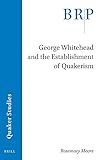George Whitehead and the Establishment of Quakerism / by Rosemary Moore.
Material type: TextSeries: Brill research perspectives. Quaker studies.Publisher: Leiden, Netherlands ; Boston : Brill, [2021]Description: 1 online resource (130 pages)Content type:
TextSeries: Brill research perspectives. Quaker studies.Publisher: Leiden, Netherlands ; Boston : Brill, [2021]Description: 1 online resource (130 pages)Content type: - 9004500138
- 9789004500136
- 289.6092 23
- 289.642 23
- 270
- BX7795.W43 M66 2021
- BX7676.3
- online - EBSCO
| Item type | Current library | Call number | URL | Status | Notes | Barcode | |
|---|---|---|---|---|---|---|---|
 eBook
eBook
|
Biblioteca "Angelicum" Pont. Univ. S.Tommaso d'Aquino Nuvola online | online - EBSCO (Browse shelf(Opens below)) | Online access | Not for loan (Accesso limitato) | Accesso per gli utenti autorizzati / Access for authorized users | (ebsco)3026202 |
Online resource; title from digital title page (viewed on October 14, 2021).
George Whitehead was a key figure in Quakerism from around 1660 until his death in 1723, but he has been neglected in recent scholarship. He was an effective political lobbyist in the struggle for religious toleration and was active in the developing work of the national Quaker bodies, Yearly Meeting, Meeting for Sufferings, and the Morning Meeting. He was also a leader in the adaptation of Quaker theology to the needs of the late seventeenth century. In his old age he was involved in the campaign to permit Quakers to use a form of affirmation instead of judicial oaths. This study by Rosemary Moore begins with an account of his life, using his memoirs and other contemporary sources, continues with a consideration of his published works, including his understanding of the 'light within', and concludes with a look at his place in Quaker history in comparison with George Fox and William Penn.
Preliminary Material / Rosemary Moore -- Copyright page / Rosemary Moore -- Abbreviations / Rosemary Moore -- George Whitehead and the Establishment of Quakerism / Rosemary Moore.


